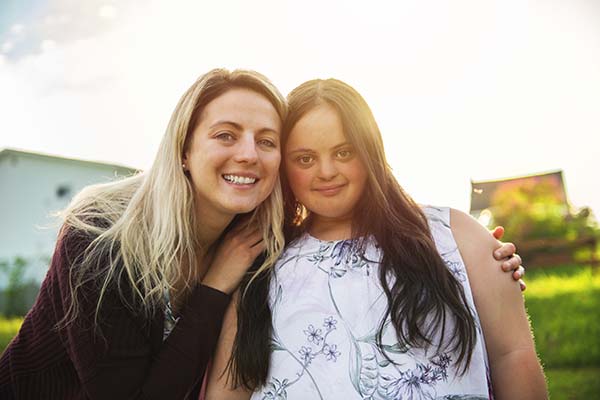
Polling shows that the number one worry for Americans as they age is memory loss, outpacing fears of insufficient monies, and loneliness. The most prevalent among all dementia is Alzheimer’s disease. According to the Alzheimer’s Association Facts and Figures Report, Alzheimer’s accounts for an estimated 60 to 80 percent of diagnosed dementia cases. Projections for increasing numbers of Alzheimer’s patients in the coming decades is cause for concern. However, in this digital age where disinformation is in abundance, Right At Home has identified ten persistent myths about Alzheimer’s that should be dispelled for clarity’s sake and because worry increases stress levels, which is bad for the brain.
Myth #1: If I live long enough, I will likely develop Alzheimer’s disease.
The fact is that developing dementia is not a natural function of aging. While there are more diagnosed cases than ever before, and risks increase as we age, it is not inevitable that age equals Alzheimer’s. A University of Michigan poll of people in their 50s and 60s found half the respondents expect to develop serious cognitive and memory loss as they age. The statistics show only twenty percent of older adults will experience dementia.
Myth #2: If I have a genetic predisposition for Alzheimer’s disease, I can do nothing to prevent getting it.
It is a fact that a higher risk for dementia does run in some families. However, research data presented at the July 2019 Alzheimer’s Association International Conference suggest that even those with a higher genetic propensity to develop Alzheimer’s can lower their risk by adopting lifestyle choices that address brain health. Actionable lifestyle choices decreased dementia risks by 32 percent. A study of identical triplets from the University of Toronto (December 2019) revealed while two contracted dementia, the third did not. While there are no guarantees, there are preventable strategies.
Myth #3: If I already have amyloid plaques and neurofibrillary tangles in my brain, I will soon experience Alzheimer’s disease.
Today’s medical technologies like PET scans and other brain imagining techniques show that some people have these plaques and tangles but display no obvious outward disease symptoms. The brain is highly resilient and plastic, creating workarounds or backup connections that bypass the affected brain cells.
Myth #4: Specifically engineered brain games will provide the mental exercise I need to protect against dementia.
Neurologically focused computer games, puzzles, and similar brain “training” products are somewhat useful. Still, they do not provide a greater benefit than other mind-challenging activities. You are just as well off learning a new language, taking an art class, reading, playing video games, traveling, or even working at a mentally stimulating job. These activities help the brain build new connections; in particular, learning something new is especially beneficial.
Myth #5: All I need is solitary brain exercise.
The fact is that while engaging in intense mental focus is great, interacting with other people is more beneficial. Socialization stimulates many more regions of the brain, and those who regularly engage in social activity consistently have a lower incidence of dementia. Staying connected, even virtually in this age of social distancing, also prevents becoming part of the epidemic of loneliness, which leads to many negative health consequences. There are many reasons to stay socially engaged.
Myth #6: Skipping physical exercise is permissible as long as I get mental exercise.
It is a fact that brain stimulation matters, but it is also a fact that exercising our muscles is as important for brain health because the two work together. Physical movement requires brain and muscle memory. Whether you move about a park or a gym, you need to know where to go. You also must know what to do, how to complete each task, and move to the next. In this multi-tasking body/brain exercise work, each function enhances the other—muscles matter.
Myth #7: Only aerobic exercise benefits the brain.
Muscle-strengthening activities are as important as aerobic exercise. It is true that having an aerobically fit heart is good for a healthy brain but lifting weights, doing squats, planks, pushups, and working with resistance bands are all known to boost memory. In some instances, strength training can even reverse memory loss because building muscle makes us overall healthier, and it also increases several beneficial chemicals in the brain.
Myth #8: I can take supplements to protect my brain health.
The fact is you are better off eating a diet that includes lots of quality vegetables and fruits, grains, poultry and fish, and healthy fats like olive oil. America is overrun with vitamins, herbs, and promises of brain health substances. The World Health Organization has recently stated no reputable study confirms the value of these vitamins, herbs, or supplements. Save your money and talk to your doctor about a healthy diet instead.
Myth #9: Drinking alcohol protects my brain.
The fact is experts do not agree about the studies associated with moderate drinking, in particular red wine, with brain health. However, the experts all do agree that drinking too much is very harmful to the brain. Heavy drinking shrinks the brain. The Lancet Public Health Journey states that “alcohol disorders are the most important preventable risk factors for all types of dementia.” As part of your diet plan, talk to your doctor about a safe amount of alcohol for you.
Myth #10: Alzheimer’s disease is not related to other health conditions.
No disease is unrelated to other health conditions in our bodies. Many chronic conditions and diseases can harm our brains like high cholesterol, high blood pressure, diabetes, depression, stress, insomnia, hearing and vision loss, and even gum disease raise the risk of Alzheimer’s. Regular healthcare that manages existing conditions can also lower the risk of memory loss or slow its progression. Routine medical appointments, taking medications as prescribed, and following doctor recommendations can help to preserve brain health.
If you or a loved one have been diagnosed with Alzheimer’s, now is the time to plan. We can help create a comprehensive legal plan to address how to pay for care without losing everything you’ve saved over the years. We would be happy to talk to you about ways we can help. Please contact our New York Office or call us at (212) 937-84











